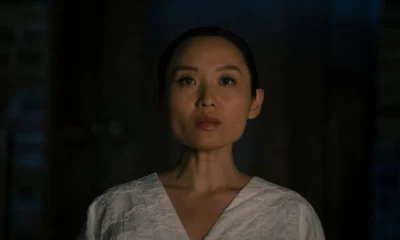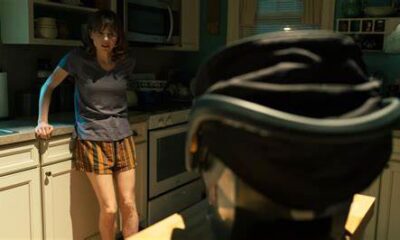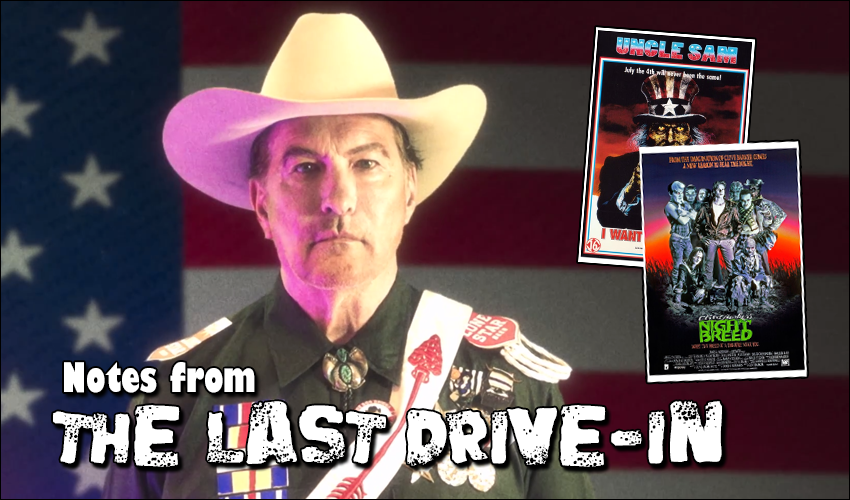
Notes from the Last Drive-In: S4E10 – ‘Uncle Sam’ and ‘Nightbreed’
We are back to the drive-in for a final night until later this fall with S4E10, featuring Uncle Sam (1996) and Nightbreed (1990). How does this finale stack up with the rest of the season, and is the July 4th theme something that works, or is this another example of the theming mismatch that has plagued this season?
Let’s see what Shudder had in store for us on July 1st, 2022.
Uncle Sam (1996)
Specific names carry weight in horror, especially among the Drive-In audience. Uncle Sam, a 1996 black comedy slasher, features two names: director William Lustig and writer Larry Cohen. Lustig and Cohen should be familiar to fans of The Last Drive-In from Maniac, Maniac Cop, The Stuff, and Q The Winged Serpent – all films spotlighted on the show before. But those are not the only names attached to the film worth noticing, either. This low-budget slasher has some iconic character actors, including Isaac Hayes, William Smith, David Fralick, Bo Hopkins, P.J. Soles, and Robert Forster. Add in Troma-cinematographer James Lebovitz and frequent Sam Raimi editor Bob Murawski, and you have one hell of an assembly of talent.
It’s a shame, though, that the film is so mild.
Uncle Sam is a Gulf War-era story about the friendly-fire death of Master Sergeant Sam Harper (David Fralick), whose charred and re-animated body goes on a murder spree starting in Kuwait and taking him to his down of Twin Rivers during the yearly Independence Day celebration. The arrival of Sam’s coffin to his widow, Louise (Anne Tremko), estranged sister, Sally (Leslie Neale), and idolizing nephew, Jody (Christopher Ogden), begins to open up old wounds in the family. Thankfully, veteran Jed Crowley (Isaac Hayes) is there to help steer young Jody and aid in the fight as Sam’s sinister return takes Twin Rivers by storm.
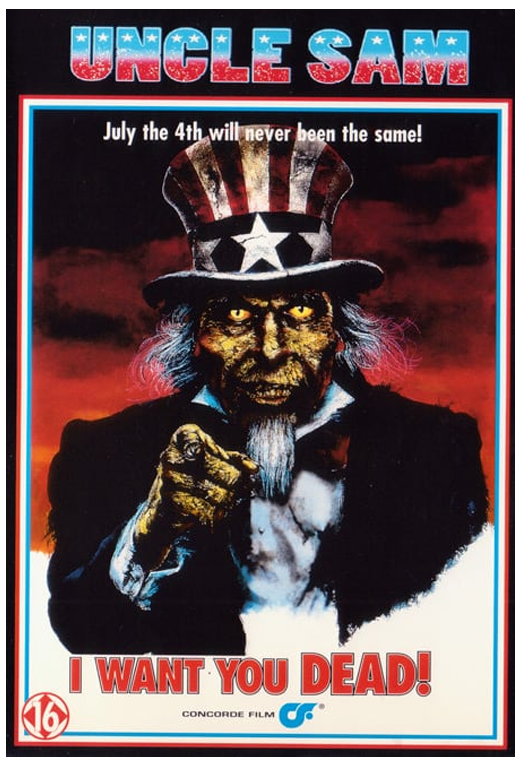
The movie is not terrible, but it is also a far cry from previous Lustig and Cohen collaborations. The film tries to evoke the spirit of the 1980s slasher in the mid-1990s, but by playing fast, loose, and straight, the film feels like a pale imitation of more iconic movies. The holiday theme, a costumed killer, and a strange handful of dispatching methods that evoke the one-upmanship of other slasher series – all result in a slasher that feels pretty bland, especially when the genre would be re-invigorated and mastered by Wes Craven’s Scream, only a month or two later.
Slashers have never been high art, except for one or two films. Often it is a genre that makes strange logical leaps and constructs bizarre set pieces to find a novel way to carry a no-importance character to establish menace and earn a laugh and a thrill. The biggest problem with Uncle Sam is that, except for a kill or two, most of the murders are weak affairs. Sometimes the film even undercuts the inherent build-up of tension, suggesting one form of murder only to abandon it and go with something else to little effect. It doesn’t help that for a black comedy; the film is largely devoid of significant laughs – though one sequence involving a chase on stilts is peak absurdist slasher humor. If the misdirections in what the film sets up are on purpose, as a kind of joke or commentary, they primarily do not land.
The performances are fine. The veteran actors are suitably game with the premise and are why the film works. Child actors can be tricky to assess, and sometimes nuances in characters are hard to see play out: If Christopher Ogden was playing the character of Jody as an unstable kid going down a dark, violent path, he did well. If that was not the intent, then perhaps not. The film doesn’t provide enough depth for us to care one way or another. The best performance comes from Isaac Hayes, who has a semblance of an arc and gets to deliver some of the best lines of the film. His character has a sense of nuance and is generally charismatic – the role model Jody needs and the one who sets him straight.
I don’t necessarily want to belabor that I wasn’t a huge fan of the film. I think the editing, direction, and cinematography were solid. I especially loved the patriotic montage opening. I think the film has a good set-up, but I also feel that Cohen could have done a little more work to deliver something more substantial.
Joe Bob-servations on Uncle Sam
Joe Bob’s take on Uncle Sam was pretty fair regarding enjoying the movie but recognizing the flaws. There were several moments during the host segments where he pointed out some of the puzzling and somewhat lazy approaches the film took to sets-ups and motivation. He pointed out that the film is essentially a riff on the earlier Maniac Cop series.
Of course, the insights on the production, cast, and crew were excellent. But perhaps the most entertaining reflection of the evening was Joe Bob discussing his time spent with Robert Forster. Forster’s career at the time was on a downturn, just before Jackie Brown and Joe Bob’s own career path pre-Shudder was quite similar. It was a touching tribute to the departed actor with a bit of reflection.
Final Thoughts on Uncle Sam
Uncle Sam is a middling-to-fair entry in the late slasher canon that plays a little too straight with the tropes and trends to its detriment. With the amount of Drive-In talent attached, fans of the show may be expecting more than this film can deliver. In comparison and around the same time, Jack Frost presents a much stronger example of what Uncle Sam may have been aiming for.
Joe Bob Briggs gave Uncle Sam 2 and 1/2 out of 4 Stars. I can’t help but give Uncle Sam 2 and 1/2 out of 5 Cthulhus.
 (2.5 / 5)
(2.5 / 5)
Best Line: “Don’t be afraid, it’s only friendly fire.” – Sam
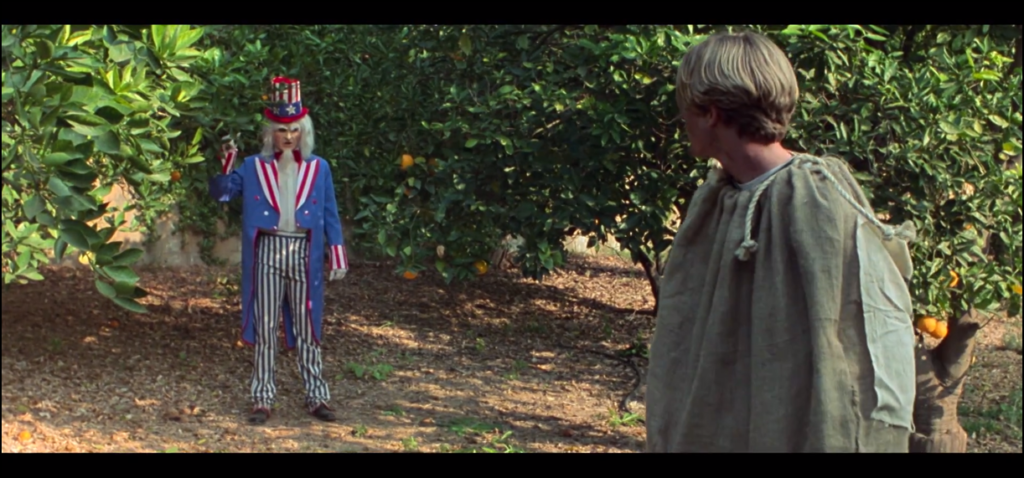
Nightbreed (1990)
Now Nightbreed (1990) is one hell of a selection to end a season on. This film has had a wild journey from a disappointing follow-up to Hellraiser to a much-beloved cult favorite that reflects a promising film career cut short. The film is a dark horror fantasy written and directed by Clive Barker, adapted from his 1988 novella Cabal. This film was the second of the three total films directed by Clive Barker, the last being 1995’s Lord of Illusions. Nightbreed re-unites Barker with cinematographer Robin Vidgeon, who handled Hellraiser, and features two editors, Mark Goldblatt and Richard Marden; the latter left the film in protest due to studio interference. The film also features a score by Danny Elfman.
The movie stars Craig Sheffer, Anne Bobby, David Cronenberg (yes, that Cronenberg), Hugh Quarshie, and Doug Bradley.
Nightbreed is set in Calgary and follows Aaron Boone (Craig Sheffer), a man consumed by dreams of a city of monsters called Midian. His girlfriend, Lori (Anne Bobby), asks him to visit a psychotherapist, Decker (David Cronenberg), who is secretly a serial killer who seeks to pin his crimes on Boone. Decker’s scheme is derailed as an injured Boone encounters a man named Narcisse (Hugh Ross), who also knows something of Midian. Soon, Boone finds himself on a journey to Midian, where he may share a vital connection with the monstrous residents, while Decker and Lori seek him out.
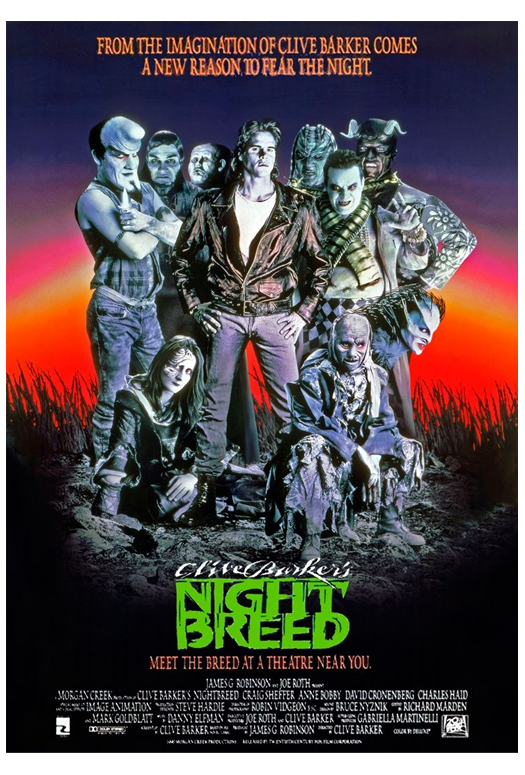
Nightbreed, this restored version, at least, is one of those rare horror epics where the scope is so much bigger than a madman hacking up teens. There is a real sense of texture in the setting and a sense that there is so much more story to tell. The theatrical cut of the film featured a bit of that, but it took the ardent desire of fans to restore the film as closely to Barker’s intent to make these elements clear. The film’s story is good, but it does suffer from the feeling of being the first act of a longer, more complicated story, the resolution being a tease for an adventure ahead that we’ll likely never see. This ultimately leaves the film feeling a little empty in that regard.
Simultaneously, though, there is also so much going on in the film that can feel a bit crowded, and significant moments come off as more confusing or puzzling rather than beats in a larger conflict. The introduction of the Berserkers in the film’s third act, coupled with the motivations of the deity Baphomet, is an excellent example of this. There is something more to it, but the film just does not have the run time to devote to developing these angles. So too with the various forces that converge on Midian. The local police, almost sweeping in as the film’s true villains, are reduced to a stock and abusive militarized force without a chance to grapple with the implication of Midian and why its presence is so upsetting beyond “they’re different!”
If there were ever a story needing a streaming series adaptation, perhaps Nightbreed is the best choice.
I’ve spent a lot of time here discussing the film’s story, but that is because this film has something genuinely incredible that another take can bring to the surface. The rest of the elements in the movie are excellent, however. But they are a lot like a fresh coat of paint on a crumbling wall: the issues at the story’s heart persist, despite the technical and performance achievements. The film looks fantastic. The rich, gothic set designs, elaborate matte paintings, and detailed sets create an epic underground look. The Danny Elfman score is also equally epic.
The acting is excellent across the board. Craig Sheffer and Anne Bobby are effective as somewhat doomed lovers but could have had far more to sink their teeth into. What they do have works, however. However, the critical performance in all of this is David Cronenberg playing a sadistic masked killer. While his role would ultimately confuse the studio into thinking Nightbreed was a slasher, we can partially forgive them as Cronenberg is magnetic. Between his sinister plotting, disaffected personality, and masked presence, he is one of the more unique slashers introduced to film. It is enjoyable to watch his character change his goals and embrace the absurdity of the presence of a city of monsters under a graveyard. Cronenberg’s Dr. Decker is a chaos agent.
Joe Bob-servations on Nightbreed
Joe Bob’s praise of Nightbreed was effusive, especially given his admittedly cold reception of the film upon release. The host segments were a tribute to hardcore fans who loved the strange little monster film and recognized there was more to it. His relaying of the story was a lovely tribute to one of the more positive elements of fandom. These days we focus so much on toxic fandoms that it is such a breath of fresh air to cover a story of a fandom doing right by a creator.
The night’s final segment featured Joe Bob doing a riff on the infamous speech from Patton (1970) as a Lone Star General. It was a fun and inspiring choice to close out the season and the July 4th-themed evening. He may have worn his heart on his sleeves, but his shoulders had beer packaging cardboard epaulets.
Final Thoughts on Nightbreed
Nightbreed is an excellent film despite some significant issues. There is so much lost potential that I can’t help but appreciate what it was going for. While it doesn’t stick to the landing, the execution is strong, and there are some iconic elements worth praising. I hope that one day someone realizes the potential of Nightbreed and lets Clive Barker return to it to achieve what he wanted. It is not a perfect film, but it is a tantalizing glimpse at a missed opportunity.
Joe Bob Briggs gave Nightbreed 4 out of 4 Stars. I think that was a reasonable assessment as it featured blood, breasts, and beasts – the drive-in essentials. The man said he would give it 5 stars if he could. As much as I adore the movie, I do think it has some critical flaws. I give Nightbreed 4 1/2 of out 5 Cthulhus.
 (4.5 / 5)
(4.5 / 5)
Best Line: “You are a freak and a cannibal and you’ve come to the wrong town.” – Captain Eigerman
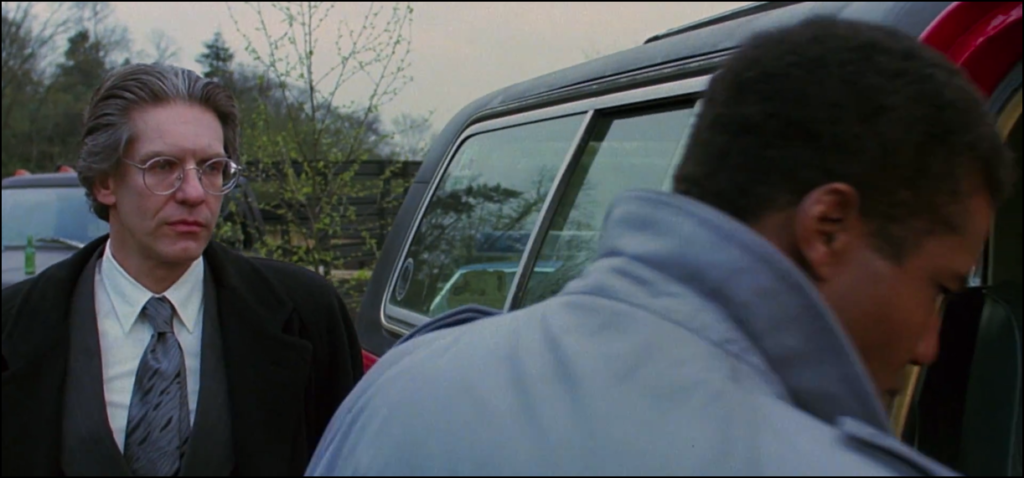
Haunted MTL Drive-In Totals
Shudder has provided the official drive-in totals on their Twitter account.
As for our own totals for the season finale, we have:
- 1 Wooden Leg
- 2 Chart-driven Rants
- 2 Instances of ‘Thee-ate-er’
- 33 Houses in a Legal Entanglement
- 200+ Monsters
- 500 Boxes of 35 MM Film Strips
- Gratuitous Flaggery
- Gratuitous Doug Bradley Brief Appearance
- Blind Groping
- Self Scalping
- Car Exploding
- Absent Father Fu
- Chart Fu
- Tomb Defacing Fu
- Montage Fu
- Spray Can Fu
- Cronenberg Rolls
- Training Video
- Patriotic Jokes

Episode Score for The Last Drive-In S4E10 – Uncle Sam and Nightbreed
Again, we have a situation where the night’s theme was somewhat hollow, and only one of the films really hit the mark. I suppose there is any number of logical leaps and connections one could make to connect Nightbreed to the stated them, but that is far more critical work than should be necessary. So as has been an issue with season 4, the stated theme for the evening just doesn’t work. That is okay, though. It becomes less of a problem when the movie pairing is stronger, and though Uncle Sam fits the July 4th theme, Nightbreed was the night’s highlight.
Overall, season 4 was quite strong with the movie selection. It featured perhaps the most diverse array of movies with some wild swings in pairings since season 1. While I wasn’t a fan of tying movies to explicitly stated themes, they worked when they worked. Everything else, however, was excellent. I appreciated the rapport between Joe Bob and Darcy this season, and I enjoy the show taking risks by stitching music videos and skits into the fabric of the evenings. The show is still one of the best things Shudder has ever done, and with the recent announcement of season 5, it should continue to be.
I give this season finale of The Last Drive-In with Joe Bob Briggs four out of five Cthulhus.
 (4 / 5)
(4 / 5)
And that is it for us here at Haunted MTL for The Last Drive-In. We’ll keep readers posted on announcements and news as it develops regarding future seasons and specials. We’ll also return to live-tweet the shows as well.
Sponsored Link
Want more Clive Barker in your life? Why not read Cabal, the novella that inspired the movie Nightbreed? Use our sponsored link to snag a paperback and help support Haunted MTL.
Movies n TV
Wheel of Time A Question of Crimson Is a Political Espionage Delight
Episode two of Wheel of Time felt like the beginning of a long journey. Stories are unfolding, lives are changing, and blood is spilling.
Let’s discuss.
The story
We begin this episode in the past with Elayne’s mother, Queen Morgase. It turns out her rise to the throne was a bit, shall we say, cutthroat. So when she shows up at the White Tower, Siuan is concerned.
She might have reason to be, too.
Meanwhile, Rand, Egwene, Moiraine, Lan and Aviendha are in the Spine of The World. As they travel through some of the most breathtaking lands I have ever seen on a TV show, Egwene is plagued with nightmares. We think at first that’s just her trauma working itself through her system. But we soon find out that it might not be that straightforward.
Finally, Perrin returns home to heal after his hand is almost cut in half. But when he gets there he finds the town has been infested by Children of The Light. And they’re looking for him.
What worked
There was something heartwarming in this episode about political espionage and choking religious persecution. And that is Elayne’s relationship with her family.
I have consumed a lot of fantasy content with royal families. And I have never once heard a princess call her mother ‘Mum’. I’ve never seen royal siblings get along. And I have sure as hell never seen a princess have a good relationship with her step-parent.
This was refreshing. Even though Queen Morgase is kind of a horrible person she seems like a good mother. And that’s an unexpected delight.

Of course, this is just one storyline among many. And while this can sometimes be overwhelming, in this case it wasn’t.
I’ll be honest, some of these storylines are going to drag for me. I know this because I’ve read some of the Wheel of Time books and I have an idea that not all the characters exactly pique my interest.
No one likes all the characters. No one likes all the storylines. While I am here for the political espionage between Queen Morgase and Siuan, not everyone likes it. While others might be fascinated with Selene trying to win Rand back, I couldn’t care less.
Having multiple storylines keeps everyone’s attention better. So long as things don’t get out of hand. Things can easily get out of hand. But this seems to be managed well.
So far.
What didn’t work
As I mentioned above, I’m not thrilled with Rand’s story at this point. And while it’s fine to not like a storyline when there are this many to choose from, it’s not fantastic that the one I like the least is the one involving our two main characters. And anytime we were with the team at the Spine of The World, the only thing that brought me joy was Moirain’s hat. It reminded me of Stockard Channing’s hat in Practical Magic.
The problem is that Rand is Charlie Brown with controversial magical powers. He is boring, serious, and pessimistic.
And yes, I understand that he has a heavy emotional burden and he’s the Dragon Reborn and that’s quite taxing and all. But let’s be fair, there isn’t a single person in this show that doesn’t have a heavy burden. And most of them manage to be fun occasionally.

All that being said, this episode of Wheel of Time did exactly what it needed to do. It set up conflicts at each of the three locations. It established emotional ties between the characters and the events. And it established goals for everyone.
This was, in short, a solid episode. Not groundbreaking, not mind-blowing or life changing. It was simply good. It was entertaining and moved the plot forward.
Well done.
 (3.5 / 5)
(3.5 / 5)
Movies n TV
Wheel of Time Returns With A Bang
Wheel of Time is back for season three. There are mixed feelings regarding this. Last season, there were some serious pacing issues. And some serious sticking to the book’s storyline issues. But we’re two seasons in, and we don’t give up so easily. So let’s dive into episode one, To Race the Shadow.
By the way, I highly recommend watching this episode with the subtitles on. You’ll see why.
The story
We begin this episode with Liandrin facing a trial of sorts for her rampant betrayal. She does her best to gaslight her Aes Sedai sisters into thinking that Siuan Sanche is the real traitor.

When that doesn’t work, she reveals how many Black Aes Sedai have actually infiltrated the tower.
Spoiler, it’s a lot.
In the aftermath, our whole team gathers to drink and enjoy one night of relaxation before they head out to the Tear to form an army for Rand. All is going well until they’re attacked by myriad creatures and a sentient axe.
What worked
This episode was long. It had a run time of an hour and eleven minutes. And a lot of that run time was spent in heavy dialog scenes.
Fortunately, these were well-done scenes.
If you’re going to have a lot of talking scenes, there are good ways and bad ways to do it. Last season, we saw lots of examples of the bad way to do it. But this episode did it well. For one thing, other things were going on while conversations were taking place. The characters are drinking, playing games, walking through an interesting city. And the scenes themselves didn’t stretch out. They weren’t repetitive. We heard what the character had to say, then we moved on.
It was also nice that the point of these scenes wasn’t just info dumps. We had character development. We had romantic interactions. We had plot development and foreshadowing.
Overall, this episode felt like what it was. A moment of calm before a storm.
Taking a step back, I’d be remiss if I didn’t address the fight scene at the start of the episode. Because it was epic.
The magic looked amazing. The martial arts that went along with it looked fantastic. The costumes were beautiful. It was just incredibly fun to watch.
More than that, it was emotional. We lost some characters in that fight that were important. And it was clearly emotionally shattering for many of our characters, who found themselves betrayed by people they trusted.
So many of them.
It was a great way to open the season.
What didn’t work
Despite that, this episode wasn’t without its flaws.
First off, there were a lot of dialog scenes. And they were good scenes, as I’ve already discussed. But it was one after another after another. And when your episode is, again, an hour and eleven minutes, it’s maybe a little much to have so much chit-chat. Couldn’t some of these conversations, important as they were, have been moved to maybe another episode?
Finally, I want to talk about Egwene’s travel through the arches.

I feel like maybe there were some deleted scenes here. Because there must have been more to that visit than what we saw, right?
We could have seen Egwene battle Rand. That would have been badass and emotionally devastating. We could have seen her with a quiet life with Rand back home at the Two Rivers. We could have seen anything except for the quick clip of Rand in a bloody river, followed by Egwene being shoved back out in a bloody shift.
Bad job. But at least it wasn’t an extended scene of Moiraine collecting bathwater, and then taking a bath while looking sad. If we’d started this season with another scene like that, it might have broken my brain.
Amazon dropped the first three episodes at once. So we’ll be back soon to talk about episode two. See you then.
 (4 / 5)
(4 / 5)
Movies n TV
Entertaining as hell: Eight Legged Freaks (2002) Review
Early 2000s is a special era for the industry. It accepts the cheesiness and corniness of movie making, in turn producing some gems in their own right. Eight Legged Freaks starring David Arquette and young Scarlet Johanson is a horror comedy about giant spiders who overtake a small town. As crazy as that premise sounds, the movie surprisingly has a ton of heart and is super entertaining. Let’s review, shall we?
Plot
We start Eight Legged Freaks with a shot of toxic waste spilling into the water supply of Joshua, a spider farm owner. He is friends with Mike, one of our protagonists, who is a science geek and a spider enthusiast. Mike notices something quite right upon visiting Joshua, but no one takes him seriously. We are then introduced to the rest of the crew. Mike’s mother Samantha, the town sheriff, is too busy chasing Ashley, his sister, who is dating the town mayor’s son Bret (something Samantha does not approve of). We also have Chris, who returns to the town to save his father’s legacy in the town mines. He has opposition from Wade, Bret’s father, who wants to use the mines for his business ventures. Lots of drama going on that will only get juicier once the spiders get loose.
The creepy crawlies quickly dispose of Joshua and make their grand appearance after Ashley rejects Bret’s advances, abandoning him in the middle of a desert. A glorious chase sequence ensues as the spiders make their way towards the town, wreaking havoc on its residents. In a true horror fashion (which the movie acknowledges), it takes some convincing from Mike and then from Samantha for the town to take the threat seriously. The tongue-in-cheek style of narrative adds the comedy aspect to a movie that would otherwise burn out fairly quickly.
The remaining characters hide out in a shopping mall as it’s the only somewhat sturdy building in the area. This doesn’t last long as the spiders break in, forcing them to run through the mines. Their resources to fight the creepy crawlies off are limited as the methane gas doesn’t allow them to use firearms. Such conditions require resourceful thinking from Chris, who uses perfume to fend off the leader of the spider group and save himself during the climax of the movie.
Character dynamics are not forgotten once the action kicks in. We have Chris confessing his long-term feelings for Samantha which she knew all along, which provided some comedic relief. Bret also reunites with Ashley and apologises for being an asshole. Mike finally gets the appreciation he deserves as his knowledge saves the townsfolk more than once during the whole ordeal.
We end the movie with the town’s radio show person telling the story as an urban legend during his segment. This brings it into question – how much of it happened the way he said it did? We can only guess…
Overall thoughts
Eight Legged Freaks is a fun creature feature with some self-aware commentary on genre tropes that doesn’t take itself too seriously. The acting is good, the pacing fitting and the characters are likeable enough for you to want them to make it through. Definitely a must watch, if you don’t suffer from arachnophobia, that is.
 (5 / 5)
(5 / 5)








